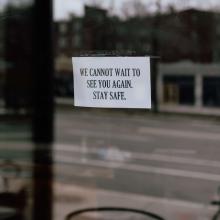coronavirus
Marie Dennis, senior advisor and former co-president of Pax Christi International, and Rev. Jim Wallis analyze the importance of government social programs to provide true security to our nation.
In the 18 hours after President Trump publicly mused at a news conference about treating the coronavirus by injecting disinfectants such as bleach and Lysol, 30 calls were made to New York City’s poison control about toxic exposure to household cleaners.
The COVID-19 pandemic has revealed the dark and disturbing injustices and inequities that have always existed in our health care, economy, and government. Though the virus may not discriminate, our humanmade systems and structures do. And in the United States this means that those who are feeling the impact of this disease most acutely are those who have been historically, structurally, systemically, and politically marginalized and oppressed.
Rev. Dr. Cynthia Hale, the founder and senior pastor of the Ray of Hope Christian Church, talks with Rev. Jim Wallis about the need to observe the sabbath during this time of the COVID-19 crisis.
The threat to churches across the country, especially churches in low-income areas, caused Justin Giboney, President of the AND Campaign, to start the Churches Helping Churches Challenge. The goal: raise $500,000 in the month of April from financially secure churches, and distribute one-time grants to small churches with financial hardship.
In the midst of this COVID-19 pandemic, we are seeing more than ever who is most vulnerable to contracting and dying of this new disease — and it’s a function of often very old and deeply embedded societal structures that create and perpetuate grotesque racial and economic inequity.
Peggy Flanagan, Lieutenant Governor of Minnesota, talks with Rev. Jim Wallis about state and federal responses to the coronavirus.
How the coronavirus pandemic has further revealed the structural and racial inequalities embedded in our nation.
In this global COVID-19 pandemic, we are reeling from individual and collective grief. We are trying to figure out what life looks like on the other side, hoping for something “normal” but unsure of what that even means.
Nobody wants our society, economy, government, schools, or our families to stay on lockdown. Everybody wants our lives to re-open. But in order to do that in a way that protects health and lives, three biblical principles are necessary: truth, unity, and solidarity.
Dr. Oz, Dan Patrick, and a smattering of evangelical pastors utilize rhetoric that pits the long-term economic health of the United States against the short-term health of the actual, flesh-and-blood people living in the U.S. right now. Such rhetoric is dangerous to people’s immediate health, but it also puts in sharp relief a simmering debate among evangelicals: What does it mean to love one’s neighbor?
It’s easy to think a wave of post-virus racial violence like this couldn’t occur today. We’re not coming out of a major world war. And the modern civil rights movement, which traces its roots to actions of resistance during Red Summer, has secured more equal rights and protections for racial minorities. But we are facing official unemployment levels of nearly 20 percent, levels not seen since the Great Depression. Our civic ties have been fraying over the last few decades. And President Trump’s victory in the 2016 campaign laid bare the reality that our greatest divisions are marked not by policy disagreements but by the deeper fault lines of partisan, racial, and religious identity. Even before the pandemic, white supremacy and racial resentment resurfaced as visible features of our culture, religions, and politics.
Love him or hate him, Malthus is one of those figures who doesn’t go away.
How do we feed kids who are missing nearly 34 million meals each day now that schools are shuttered because of the coronavirus?
The number of people facing acute food insecurity could nearly double this year to 265 million due to the economic fallout of COVID-19, the United Nations' World Food Programme (WFP) said on Tuesday.
Trump’s daily press briefings resemble the kind of public idolatry that ancient Caesars engaged in.
Churches across the country are learning that loving one another and our neighbors — while physically distancing ourselves from them — is possible.
Antoniette Holt, director of the Office of Minority Health for the Indiana Department of Health, pointed to lack of reliable transportation as a challenge faced by some in African-American communities across the country, making it difficult for people to be on time for doctor’s appointments, often unforgiving when it comes to tardiness. This point is especially important during the pandemic, as social distancing practices are nearly impossible to maintain on public transit.



















